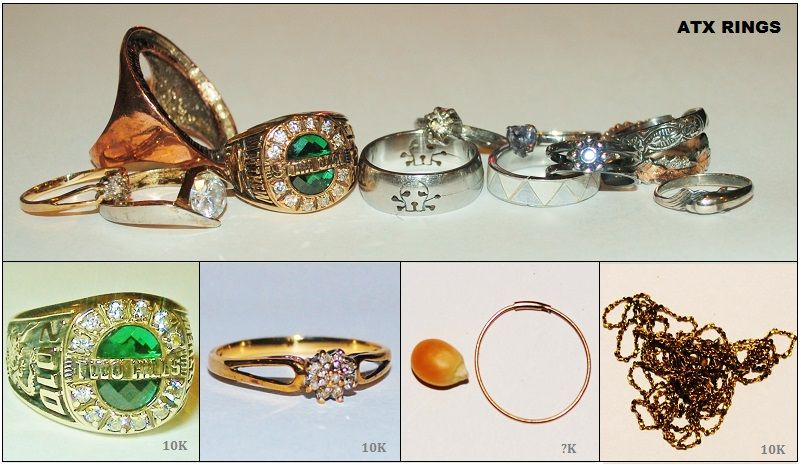
I did about 8 water hunts with the ATX. They were all in places I regularly hunt. For some hunts, I waited until the end of the swimming season so I could go and dig "DEEP" holes and not create any problems related to this. About half of the 12 rings I dug were in my second scoop, and down at least 6-8". One ring came out at an easy 20 inches. I found a coin spill down around that 20" mark, got about 8 coins, all dated from the 70's. The ring came up in that same vicinity. The area was quite far from shore......one of my favorite places to hunt with a PI. There is generally less junk out there. The cans of beer are easy to recognize because of their loud tone and wider swing compared to a coin or ring. I like to dig the quiet tones, which often times go to 20 inches deep. These have often times rewarded me with a coin or ring. However, sometimes a nasty bottle cap comes up too. Fortunately, as the hole gets deeper, a quick iron check with the ATX will often times alert you to iron junk, saving you the trouble of continuing to dig to ID it.
The large gold ring was the prize of the hunts. Although not deep in the sand, it gave a nice smooth loud high-low sound, and what a surprise when I saw it in my scoop. It has a name inscribed in it, and I am trying to make contact with the owner. I will return it to him, and probably enter the ring in Western and Eastern Treasures "FIND OF THE YEAR CONTEST".The tiny earring loop, with a dried corn kernel beside it for size gave off a nice loud soft signal. At first I missed it in the scoop and nearly dumped the remains in the water. The engineer at Garrett had tweaked the ATX for gold. This was also evident with my various targets air testing the unit. A nickel could be picked up at about 20 inches once the ATX was ground balanced, best frequency chosen and both sensitivity and threshold set as high as I could stand it, but still getting a repeatable signal.
Just for your information.....I hunt freshwater lakes and rivers only. The ocean is a days drive away heading west from Edmonton. A lot of people have been told PI detectors don't work well in fresh water lakes. This is simply not true. Just because iron doesn't rust as fast in freshwater as in salt water, it will eventually sink in the sand to great depths, often out of reach for even PI's. Large pieces of iron can easily be discriminated either by the iron check, or better yet, the degree to which the user has learned his detector. To be successful using a PI, you must be educated enough to learn how to pick your locations wisely. And this comes from many many hours of practice.




